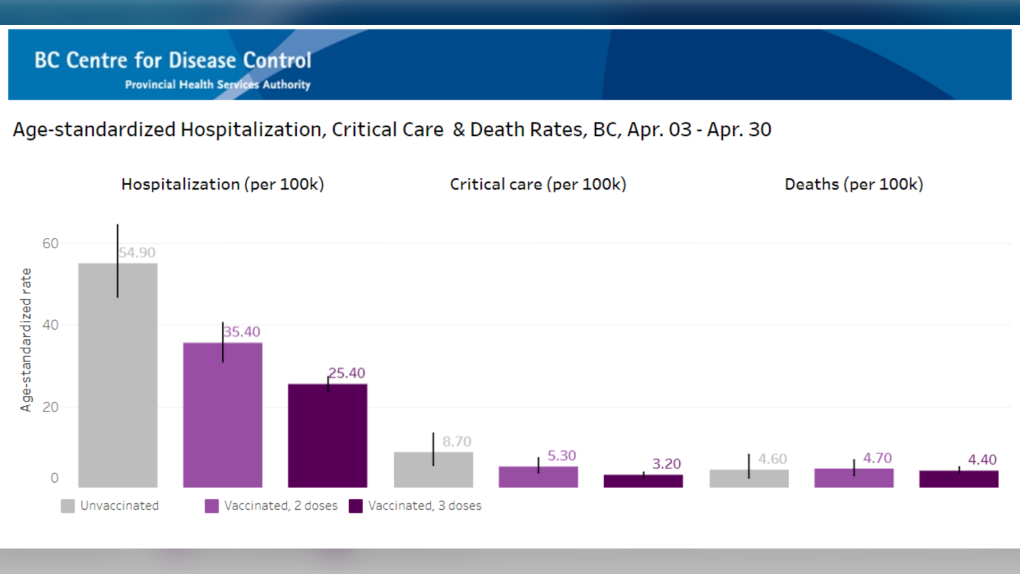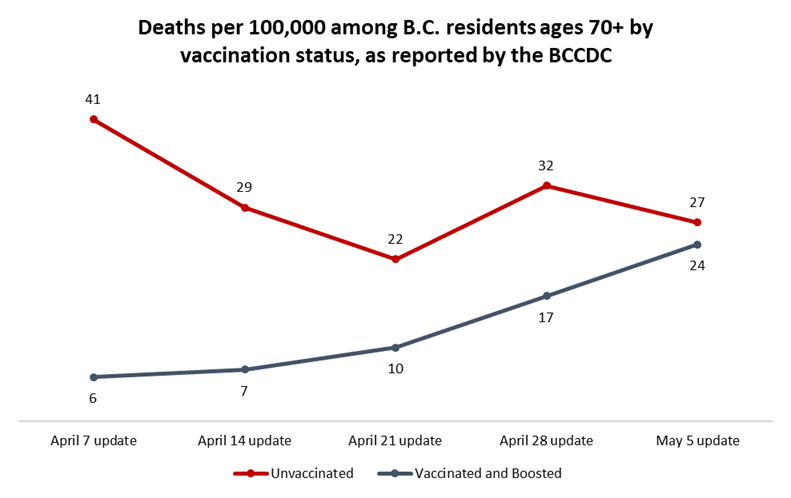B.C.'s new method of counting COVID-19 deaths may be obscuring benefit of vaccination
 A screenshot from the B.C. Centre for Disease Control's COVID-19 Surveillance Dashboard shows little difference in death rates by vaccination status between April 3 and 30. (BCCDC)
A screenshot from the B.C. Centre for Disease Control's COVID-19 Surveillance Dashboard shows little difference in death rates by vaccination status between April 3 and 30. (BCCDC)
While it's long been known that vaccination significantly reduces the likelihood of severe outcomes from COVID-19, B.C.'s recent change to how it reports deaths related to the disease may be making it harder to see that in the data.
On April 2, the province began reporting "30-day, all-cause mortality" in its weekly COVID-19 updates. This means anyone in the province who dies within 30 days of a positive lab test for the coronavirus is reported as a COVID-19 death, regardless of whether the disease actually caused the fatality.
This change appears to be at least partially responsible for recent shifts in the death rates reported on the B.C. Centre for Disease Control's COVID-19 Surveillance Dashboard, which now shows essentially no difference in age-adjusted deaths per 100,000 people across different vaccination statuses.
The Ministry of Health says the data on the dashboard shouldn't be interpreted as an indication of decreased vaccine efficacy.
WHAT THE DATA SAYS
The BCCDC dashboard shows that between April 3 and 30, there were 204 deaths involving people who had tested positive for COVID-19 over the preceding 30 days in B.C.
Of those, 155 - 76 per cent of the total - were people who had received three doses of a COVID-19 vaccine. Another 30 (15 per cent) were people who had received two doses, four (two per cent) were people who had received one dose, and 15 (seven per cent) were people who were unvaccinated.
These raw totals don't account for the significant differences between the populations, however, such as the fact that the triple-vaccinated group is significantly larger and older, on average, than the other groups.
To adjust for these differences, the BCCDC calculates and reports "age-standardized" death rates per 100,000 people for the three largest groups: the unvaccinated, the double-vaccinated and the triple-vaccinated.
For the period in question, after adjusting for age, there were 4.6 deaths per 100,000 unvaccinated people, 4.7 deaths per 100,000 double-vaccinated people and 4.4 deaths per 100,000 triple-vaccinated people.
Compare that to just a few months ago, before the switch to all-cause mortality. Between Jan. 29 and Feb. 25, the age-adjusted death rate among the unvaccinated was 17.7 deaths per 100,000 people, compared to 7.6 per 100,000 among those with two shots and 2.9 per 100,000 among those with three.
The April 3 to 30 data is the first time since the dashboard was launched nearly a year ago that the difference between age-standardized death rates across the different groups has been so small.
It's also the first time that the period covered on the dashboard has included only deaths recorded under the all-cause mortality method.
HOW THE DATA IS LIMITED
The BCCDC maintains that comparisons between deaths reported before the April 2 switch and after it are unreliable.
Despite this, the dashboard – which reports roughly one month's worth of data at a time – continued to report deaths and death rates using a mix of the two systems during the month of April, when the data presented stretched back to dates before April 2.
During that time, CTV News was tracking and calculating death rates among triple-vaccinated and unvaccinated people in the vulnerable 70-plus age group. The analysis found that, as the total number of deaths came to include more weeks in which all-cause mortality was being reported, the difference between the two death rates narrowed significantly.
 As successive updates from the B.C. Centre for Disease Control included more deaths reported after the April 2 switch to all-cause mortality reporting, the death rate among triple-vaccinated B.C. residents ages 70 and older climbed. (CTV)
As successive updates from the B.C. Centre for Disease Control included more deaths reported after the April 2 switch to all-cause mortality reporting, the death rate among triple-vaccinated B.C. residents ages 70 and older climbed. (CTV)
CTV News asked the Ministry of Health how the switch to all-cause mortality could contribute to the flattening of death rates across vaccination groups – both age-adjusted and among those ages 70 and older – given the apparent correlation in the data.
"Ultimately, there are two important things to consider," the ministry said in its response.
"The first is that the overall number of deaths in people age 70 and older are relatively small. While your graphs are correct, when the overall numbers are small, the rates are unstable and are more likely to fluctuate over time."
"The second is that we switched to a new reporting system in early April which makes comparisons between the death data from before April with current data unreliable. In the new system, deaths include any COVID-19 lab positive cases who died from any cause recorded within 30 days of their first positive lab result date. This means the numbers are dependent on testing rates in people aged 70 and older. Testing rates are typically higher for those with three doses of vaccine and there may be other differences across 70-year-olds who have different vaccination status that are not accounted for in the numbers."
VACCINE EFFECTIVENESS
The ministry added that the numbers reported on the dashboard - though they include calculations of outcomes by vaccination status - are not measures of vaccine effectiveness.
"They simply show surveillance data and do not adjust for differences by testing, prior infection, and other important factors that may differ among populations with different vaccination status," the ministry said.
Calculations of vaccine effectiveness in B.C. take these factors into account, and the ministry said updated calculations are on the way.
"Vaccine effectiveness results by age and time since last dose are being finalized and will be shared publicly soon," the ministry said.
"For vaccine effectiveness analyses, we would be limiting analyses to deaths primarily from COVID (rather than all-cause mortality)," it added.
The most recent study of vaccine effectiveness in B.C. looked at the period from September 2021 to February 2022, when Delta and Omicron were the dominant variants in the province.
The summary of that study on the BCCDC website does not mention deaths, but it does conclude that vaccines "provided good protection against severe outcomes," with two doses estimated to prevent 65 to 75 per cent of hospitalizations from Omicron and a booster dose increasing that protection to more than 90 per cent.
CTVNews.ca Top Stories

Western University researchers unlock potential 'cure' for ALS
New research out of London, Ont.'s Western University is shedding light on a potential cure for ALS, in which the targeting of the interaction between two proteins can halt or fully reverse the disease's progression.
Police release 3D images of young child found in an Ontario river two years ago
Police have released a three-dimensional image of a young child whose remains were discovered in the Grand River in Dunnville, Ont. almost two years ago.
B.C. brings in law on name changes on day that child killer's new identity revealed
The BC NDP have tabled legislation aimed at stopping people who have committed certain heinous acts from changing their names.
Kamala Harris drops F-bomb during White House live-stream
U.S. Vice-President Kamala Harris used a profanity on Monday while offering advice to young Asian Americans, Native Hawaiians and Pacific Islanders about how to break through barriers.
B.C. man fighting for refund after finding someone living at Whistler vacation rental
Edwin Mostered spent thousands of dollars booking a vacation home in Whistler, B.C., for a group skiing trip earlier this year – or so he thought.
Avs forward Valeri Nichushkin suspended at least six months
Colorado Avalanche forward Valeri Nichushkin was suspended for at least six months without pay and placed in Stage 3 of the league's player assistance program.
Collapsed Baltimore bridge span comes down with a boom after crews set off chain of explosives
Crews conducted a controlled demolition Monday to break down the largest remaining span of the collapsed Francis Scott Key Bridge in Baltimore.
Security video caught admitted serial killer disposing of bodies in Winnipeg garbage bins
Security video caught admitted serial killer Jeremy Skibicki on multiple late-night outings, disposing of body parts in nearby garbage bins and dumpsters in the middle of the night.
Mortgage companies could intensify the next recession, U.S. officials warn
U.S. officials worry the next recession could be intensified by a cascading series of failures in the mortgage industry caused by crashing home prices, frozen financial markets and soaring delinquencies.
































